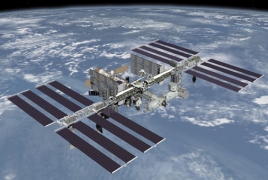
In the near future, the International Space Station (ISS) will serve as home to five organs-on-chips research experiments. Each one will tackle a different issue, but all of them are expected to shed light on the effects of microgravity on the human body and could lead to better treatments and drugs without the need for animal testing, Engadget said. Organs-on-chips are transparent slides about the size of an AA battery with microfluidic channels capable of reproducing blood and airflow that are lined with the cells of the organ being studied. Aboard the ISS, astronauts can observe the cells as they grow in 3D, since the lack of gravity means they don't settle at the bottom or flatten against the channels' plastic walls.
The first project wants to find out how microgravity's negative effect on the immune system triggers respiratory infections, which are a common ailment for ISS crew members. Another one wants to study the effects of medication on mitigating bone and cartilage degeneration, which could benefit those suffering from osteoarthritis and similar conditions. The third one wants to study cellular aging as it happens in zero-G and the cells' recovery after returning to Earth's environment.
Another team will send a kidney-on-a-chip model to the ISS to figure out how microgravity affects kidney function. They intend to use their results to conjure up better treatments for conditions like proteinuria, osteoporosis and kidney stones. The last project's study will use a brain-on-a-chip model to gather the data needed to optimize the organ-on-a-chip platform itself. While the team's main goal is to create an automated chip that can make conducting research faster and easier, their results could also provide new insight on neurodegeneration, traumatic injury and cancer.
These five will make their way to the ISS as part of a four-year collaboration between the National Center for Advancing Translational Sciences (NCATS) and the Center for the Advancement of Science in Space. NCATS will provide the projects with two years of initial funding worth approximately $6 million and will continue funding the ones that perform well for another two years after that. Christopher P. Austin, the center's director, said in a statement:
"The opportunity to partner with CASIS to perform tissue chip science on the International Space Station is a remarkable opportunity to understand disease and improve human health. Physiological functions in the microgravity of the International Space Station will provide insights that will increase translational effectiveness on earth, including identifying novel targets for drug discovery and development."

